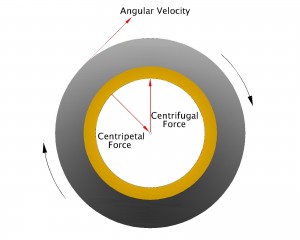
As the name suggest the process involves using a centrifugal force (high velocity spinning action) to exert pressure onto molten metal as it is poured into a Die. The Die can be set to spinning in a horizontal or vertical axis dependent on the structure required. A horizontal axis machine is mostly used for long thin cylinders and vertical axis machines are typically used for rings. The hollow cylindrical Die can generate speeds exceeding 100 G’s of centrifugal force, this distributes the molten metal and shapes it into the tubular/cylindrical forms. This method of casting, also known as liquid forging, is used to manufacture high integrity cylindrical components, and is therefore the popular technology of choice for pipes, tube, bearings, rolls, bushes, ball valves and cylinder liners. It is notably used to cast cylinder liners and sleeve valves for piston engines, parts which could not be reliably manufactured otherwise. The wall thickness of the part can be varied to suit needs and is controlled by the amount of alloy that is poured making the centrifugal casting system highly flexible to individual requirements.
Benefits of centrifugal casting
The high G forces involved in this casting method means that the less dense materials including impurities are forced into the centre where they can be subsequently removed and gas related defects and shrinkage porosity are reduced thus parts made from centrifugal casting exhibit denser, closer grained structure with improved physical qualities such as tensile strength, yield strength, elongation and uniformity. They also have the integrity and durable nature that makes them ideal for use where there is a necessity for corrosion and abrasion resistance.
Other advantages of centrifugal casting are;
Reduction of Equipment cost
Centrifugal casting offers a substantial saving on capital equipment when compared to forged products.
Reduction of Manufacturing Costs
The uniformity resulting from the centrifugal casting process means that maching time and material waste are significantly reduced. Blowholes, sand residue, hard spots, cavities and porosity are virtually eliminated.
Extensive life
Due to the finer grain and denser structure of parts cast with centrifugals there is an increased usage life, greater endurance and impact without fracturing.
Fewer Castoffs
The force used to distribute the molten metal as it is poured is so strong is displaces the lighter oxides and impurities to the centre of the hollow cylinder. It is then easy to remove these impurities during the machining process.
Flexibility
The centrifugal process allows economical production of a wide range of sizes, shapes and quantities.
In short centrifugal casting results in longer life, reduced rejects, reduction of manufacturing costs and production flexibility.
Centrifugal Casting Machine Manufacturer – Gibson Centri Tech Ltd
